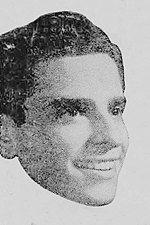Richard Hayes
Richard Hayes was born in Brooklyn, New York, United States on January 5th, 1930 and is the American Singer And Actor. At the age of 84, Richard Hayes biography, profession, age, height, weight, eye color, hair color, build, measurements, education, career, dating/affair, family, news updates, TV shows, and networth are available.
At 84 years old, Richard Hayes physical status not available right now. We will update Richard Hayes 's height, weight, eye color, hair color, build, and measurements.
Hayes was discovered by a personnel from Mercury Records in 1948. Hayes was singing at the Leon & Eddie's nightclub in New York City. He was approached by somebody who invited Hayes to perform on Art Ford's local Saturday night TV series on station WPIX in New York. Hayes eventually became a regular performer on Art Ford Saturday Night. A vice president from Mercury saw Hayes on the series and invited him to record for Mercury. Between 1948-1949, Hayes made three recordings for Mercury that weren't that successful. But his fourth recording, a version of the song "The Old Master Painter", became an instant success.
The song had been previously recorded by singers Dick Haymes, Peggy Lee & Mel Tormé, Phil Harris, Snooky Lanson and Frank Sinatra. But it was Hayes' recording of this song that made the charts. The song was ranked number 2 on the Billboard Hot 100 charts and remained there for twelve weeks.
The next song he recorded for the Mercury label was a version of the song "My Foolish Heart" in 1950. He again enjoyed the producing accompaniment of Mitch Miller. Hayes also enjoyed another hit. Although not as popular as his previous song, "My Foolish Heart" did manage to rank number 21 on the charts. Shortly after the release of the song, Miller left Mercury and joined rival label Columbia Records. Hayes remained with Mercury and recorded four more songs that did not place on the charts. But the fifth song he recorded, a duet with Kitty Kallen entitled "Our Lady Of Fatima", managed to reach number 10 on the charts beginning in September 1950 and remained there for three months.
In March 1951, Hayes recorded another duet with Kallen entitled "The Aba Daba Honeymoon". The song was also on the charts for three months. Before Hayes and Kallen recorded the song, it was made famous by Debbie Reynolds and Carleton Carpenter in the movie Two Weeks with Love the year earlier.
During the summer of 1951 Hayes recorded a version of Nat King Cole's hit "Too Young" on the Mercury label. It reached number 24 on the pop charts. That side charted at number fourteen as did the flip side "Go! Go! Go!" both recorded with George Bassman's orchestra. In late October 1951, Hayes had another big seller for Mercury entitled "Out in the Cold Again" with The Joe Reichman Orchestra. The record again made it into the top ten best sellers in the country and remained on the charts for close to three months. Hayes' next hit came in May 1952 with the tune "I'll Walk Alone" which, despite a number of versions including the big hit version by Don Cornell, Hayes' recording got to number 24. At the same time his recording of "Junco Partner", recorded with Eddie Sauter's Orchestra, was released. The record had a three-month stay on the charts and was ranked number fifteen.
His next two songs were recorded with the accompaniment of The Jimmy Carroll Orchestra. They were "The Mask Is Off" and "Forgetting You". Both of the songs were recorded in 1952, the latter being ranked number 15 on the charts. Hayes' last hit song with Mercury was entitled "Midnight in Paris", recorded in the summer of 1953 with The Richard Hayman Orchestra, which was a top twenty-five seller.
Hayes left Mercury Records in 1954 in hopes of joining Columbia Records where Miller had gone four years earlier. But when Columbia turned him down, Hayes joined the ABC label. He left ABC in 1957 and joined the Decca label. He remained with Decca for two years before Columbia finally signed Hayes in 1960. He left Columbia in 1961. He released more than 40 sides with ABC, Decca and Columbia but none of them ever made the charts.
Hayes was drafted into the military in 1953. He served in the Army and was stationed originally in Fort Dix, New Jersey then in Governors Island, New York. He served during the last few months of the Korean War. During his service in the military, Hayes was selected to become the co-host of Arlene Francis and replacement for Steve Allen on the game show Talent Patrol. He remained with the series until its cancellation in 1955 and left the military that same year.
Hayes also made frequent guest star appearances on The Ed Sullivan Show and The Robert Q. Lewis Show between 1956-1964. Hayes also made frequent appearances on Arthur Godfrey's radio and television programs between 1958 and 1972.
Shortly after the release of his last record in 1964, Hayes worked on several game shows. He first worked as an announcer on the original ABC game show Supermarket Sweep from 1965-1967, followed by a stint as host of the 1967-1968 series The Baby Game. From 1970-1971, Hayes was the host of the syndicated version of the game show Name That Tune. He also was the host of the Canadian syndicated hidden camera game show All About Faces from 1971-1972.
In the late 1970s, Hayes moved back to New York where he became a congenial radio host. He first spent several years at WMCA in New York, then went to WWDB in Philadelphia, and from there to WCAU 1210am (now WPHT), where he stayed until 1990. While on radio in Philadelphia, he wrote and recorded his radio show theme song to the tune of Secret Agent Man.
